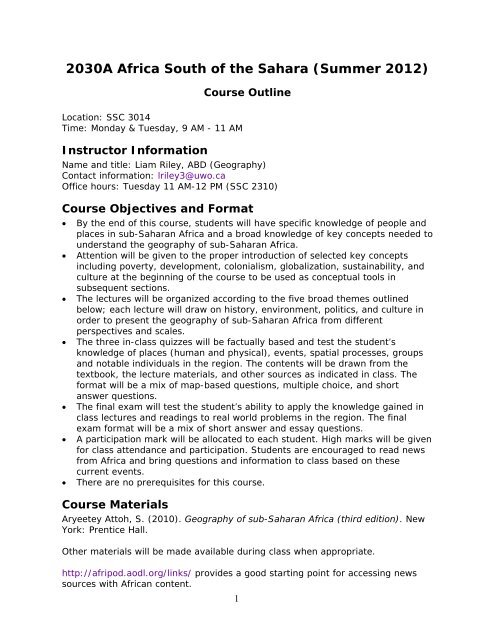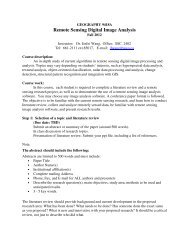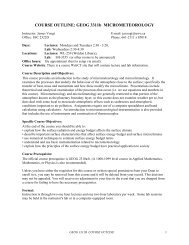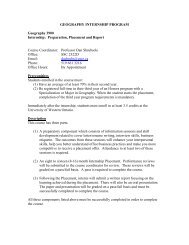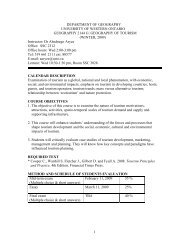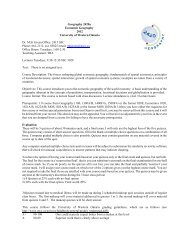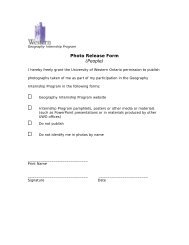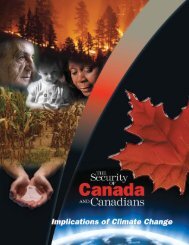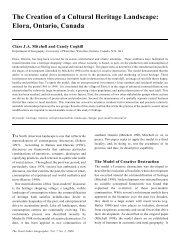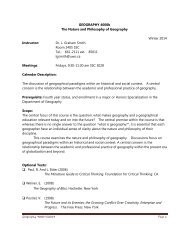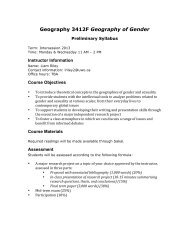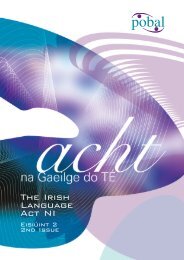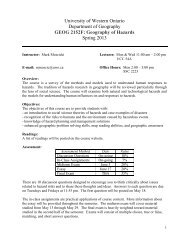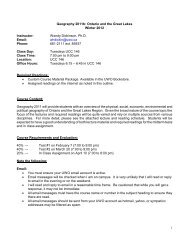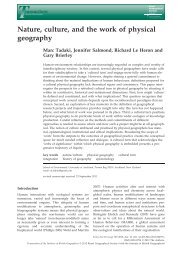2030A Africa South of the Sahara (Summer 2012) - Geography ...
2030A Africa South of the Sahara (Summer 2012) - Geography ...
2030A Africa South of the Sahara (Summer 2012) - Geography ...
You also want an ePaper? Increase the reach of your titles
YUMPU automatically turns print PDFs into web optimized ePapers that Google loves.
<strong>2030A</strong> <strong>Africa</strong> <strong>South</strong> <strong>of</strong> <strong>the</strong> <strong>Sahara</strong> (<strong>Summer</strong> <strong>2012</strong>)<br />
Course Outline<br />
Location: SSC 3014<br />
Time: Monday & Tuesday, 9 AM - 11 AM<br />
Instructor Information<br />
Name and title: Liam Riley, ABD (<strong>Geography</strong>)<br />
Contact information: lriley3@uwo.ca<br />
Office hours: Tuesday 11 AM-12 PM (SSC 2310)<br />
Course Objectives and Format<br />
• By <strong>the</strong> end <strong>of</strong> this course, students will have specific knowledge <strong>of</strong> people and<br />
places in sub-<strong>Sahara</strong>n <strong>Africa</strong> and a broad knowledge <strong>of</strong> key concepts needed to<br />
understand <strong>the</strong> geography <strong>of</strong> sub-<strong>Sahara</strong>n <strong>Africa</strong>.<br />
• Attention will be given to <strong>the</strong> proper introduction <strong>of</strong> selected key concepts<br />
including poverty, development, colonialism, globalization, sustainability, and<br />
culture at <strong>the</strong> beginning <strong>of</strong> <strong>the</strong> course to be used as conceptual tools in<br />
subsequent sections.<br />
• The lectures will be organized according to <strong>the</strong> five broad <strong>the</strong>mes outlined<br />
below; each lecture will draw on history, environment, politics, and culture in<br />
order to present <strong>the</strong> geography <strong>of</strong> sub-<strong>Sahara</strong>n <strong>Africa</strong> from different<br />
perspectives and scales.<br />
• The three in-class quizzes will be factually based and test <strong>the</strong> student’s<br />
knowledge <strong>of</strong> places (human and physical), events, spatial processes, groups<br />
and notable individuals in <strong>the</strong> region. The contents will be drawn from <strong>the</strong><br />
textbook, <strong>the</strong> lecture materials, and o<strong>the</strong>r sources as indicated in class. The<br />
format will be a mix <strong>of</strong> map-based questions, multiple choice, and short<br />
answer questions.<br />
• The final exam will test <strong>the</strong> student’s ability to apply <strong>the</strong> knowledge gained in<br />
class lectures and readings to real world problems in <strong>the</strong> region. The final<br />
exam format will be a mix <strong>of</strong> short answer and essay questions.<br />
• A participation mark will be allocated to each student. High marks will be given<br />
for class attendance and participation. Students are encouraged to read news<br />
from <strong>Africa</strong> and bring questions and information to class based on <strong>the</strong>se<br />
current events.<br />
• There are no prerequisites for this course.<br />
Course Materials<br />
Aryeetey Attoh, S. (2010). <strong>Geography</strong> <strong>of</strong> sub-<strong>Sahara</strong>n <strong>Africa</strong> (third edition). New<br />
York: Prentice Hall.<br />
O<strong>the</strong>r materials will be made available during class when appropriate.<br />
http://afripod.aodl.org/links/ provides a good starting point for accessing news<br />
sources with <strong>Africa</strong>n content.<br />
1
Assessment<br />
Students will be assessed according to <strong>the</strong> following formula:<br />
• Participation 10%<br />
• In-class quizzes 15% X 3 = 45%<br />
• Final exam 45%<br />
Lecture schedule<br />
Dates Assessments Lecture title Topics addressed in<br />
class<br />
July 9 & 10 No quiz Course overview<br />
and introduction<br />
<strong>of</strong> key concepts<br />
July 16 & 17<br />
July 23 & 24<br />
July 30 & 31<br />
Quiz 1: Tues.<br />
July 17<br />
10:15 AM-11<br />
AM*<br />
Quiz 2: Tues.<br />
July 24<br />
10:15 AM-<br />
11AM*<br />
Quiz 3: Tues.<br />
July 31<br />
10:15 AM-<br />
11AM*<br />
People and space<br />
Daily lives in sub-<br />
<strong>Sahara</strong>n <strong>Africa</strong><br />
Rural and urban<br />
development<br />
2<br />
Political borders,<br />
migration, conservation<br />
and resources<br />
Gender, childhoods,<br />
health, culture change<br />
Land grabs (current and<br />
historical), urbanization,<br />
agriculture, globalization<br />
August 7 (no<br />
class August 6)<br />
No quiz Political violence Case studies <strong>of</strong> political<br />
violence in <strong>the</strong> region<br />
August 13 & 14 No quiz Poverty & hunger<br />
(conclusion)<br />
Exploring explanations<br />
for poverty and food<br />
insecurity in <strong>the</strong> region<br />
Final exams will be held August 20 and 21 (time and date to be determined).<br />
They will be administered according to university regulations.<br />
*The quizzes will be testing factual knowledge and <strong>the</strong>refore no<br />
written materials or electronic devices will be permitted while quizzes<br />
are in progress. Washroom breaks will not be permitted during <strong>the</strong><br />
quizzes unless prior notice is given <strong>of</strong> a medical reason. The discovery<br />
<strong>of</strong> cheating will result in immediate 0 on <strong>the</strong> quiz and <strong>the</strong> student will<br />
be reported to <strong>the</strong> Department Chair for fur<strong>the</strong>r reprimand if<br />
applicable.<br />
If <strong>the</strong> instructor receives notification from Academic Counselling that<br />
<strong>the</strong>re was a justifiable reason to miss a quiz, it may be rewritten<br />
during <strong>the</strong> instructor’s <strong>of</strong>fice hours or ano<strong>the</strong>r mutually agreed upon<br />
time. The university policy states: “Students seeking academic<br />
accommodation on medical grounds for any missed tests, exams,<br />
participation components and/or assignments worth 10% or more <strong>of</strong><br />
<strong>the</strong>ir final grade must apply to <strong>the</strong> Academic Counselling <strong>of</strong>fice <strong>of</strong> <strong>the</strong>ir<br />
home Faculty and provide documentation. Academic accommodation<br />
cannot be granted by <strong>the</strong> instructor or department.”
Statement on Use <strong>of</strong> Electronic Devices<br />
No electronic devices will be allowed during tests and examinations.<br />
Statement on Academic Offences<br />
Scholastic <strong>of</strong>fences are taken seriously and students are directed to read <strong>the</strong><br />
appropriate policy, specifically, <strong>the</strong> definition <strong>of</strong> what constitutes a Scholastic<br />
Offence, at <strong>the</strong> following Web site:<br />
http://www.uwo.ca/univsec/handbook/appeals/schol<strong>of</strong>f.pdf .<br />
Western's commitment to accessibility<br />
The University <strong>of</strong> Western Ontario is committed to achieving barrier free<br />
accessibility for persons studying, visiting and working at Western.<br />
Please contact <strong>the</strong> course instructor if you require material in an alternate format<br />
or if you require any o<strong>the</strong>r arrangements to make this course more accessible to<br />
you. You may also wish to contact Services for Students with Disabilities (SSD) at<br />
661-2111 x 82147 for any specific question regarding an accommodation.<br />
Support Services<br />
Registrarial Services: http://www3.registrar.uwo.ca/index.cfm<br />
Student Development Services: http://www.sdc.uwo.ca/<br />
3


